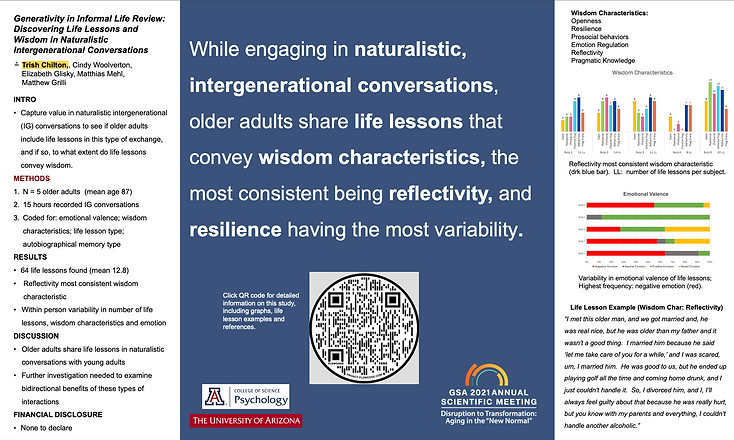
Research
My research interests involve aging, wisdom, intergenerational relationships and education.
-
How is wisdom developed and expressed, particularly in aging?
-
What does "aging well" actually mean to older adults?
-
Can different generations create connection and belonging by learning from one another?
Publications:
Pfeifer, V., Jordan, K., Chilton, T., Grilli, M., Mehl, M. (2025). Younger and Older adults’ aging well construals: A quantitative word use and topics comparison. PsyArXiv.
https://osf.io/preprints/psyarxiv/zmjb7_v2.
Chilton, P., Magrath, P., Grilli, M., Pfeifer, V., Sullivan, D., &
Mehl, M. (2024). A Spectrum of Aging: Introduction
of a reflected experience model of aging well.
Innovation in Aging, 8(Supplement_1), 1284–1285.
Pfeifer, V. A., Chilton, T. D., Grilli, M. D., Mehl, M. R., &
Department of Psychology, U. of A. (2024). How ready is
speech-to-text for psychological language research?
Evaluating the validity of AI-generated English transcripts for
analyzing free-spoken responses in younger and older adults.
Behavior Research Methods.
Chilton, P., Woolverton, C., Glisky, E., Mehl, M., & Grilli, M. (2021).
Generativity in Life Review: Discovering Life Lessons and
Wisdom in Naturalistic Intergenerational Conversations.
Innovation in Aging, 5(Supplement_1), 970–971.
Psychology Master's Project - Development of Wisdom Coding Schema

For my M.A. Psychology project, I developed a novel coding system to identify wisdom characteristics in informal, intergenerational (IG) life review.
Fifteen hours of recorded and transcribed IG conversations were reviewed for life lessons as related by older adults within an informal life review.
Older adults often engage in informal life review during conversations with young individuals. I wanted to know if these exchanges conveyed wisdom characteristics, and if so which ones?
To learn more about the project, please click the QR code in the center.
This poster was presented at the Gerontological Society of America's 2021 annual meeting.
Dissertation - The Aging Well Study
My dissertation analyzes narrative data collected from a larger study that I conducted called the "Aging Well" study. The primary study includes psychosocial measures (wisdom, wellbeing, social connectedness), and cognitive measures (online brain games, MoCA) as well as an open-ended question to better understand the concept of aging well. Using the responses given by 92 participants, my dissertation involves a qualitative, inductive thematic analysis of how older adults describe their personal experiences of "aging well." There is research objectively describing what aging well means, from wellness, health, and social perspectives, but how do older adults experience aging well in their own words? The older adults, ages 62-95 were given four minutes to spontaneously respond to the question, "What does aging well mean for you personally?" The developing themes (6 total), and sub-themes (24 total) were analyzed and coded using MAXQDA. Out of 1,618 coded segments, Lifestyles, Health, and Wellness had the most coded themes, followed by Existential themes. This analysis is being presented at the 2024 annual Gerontological Society of America conference.
